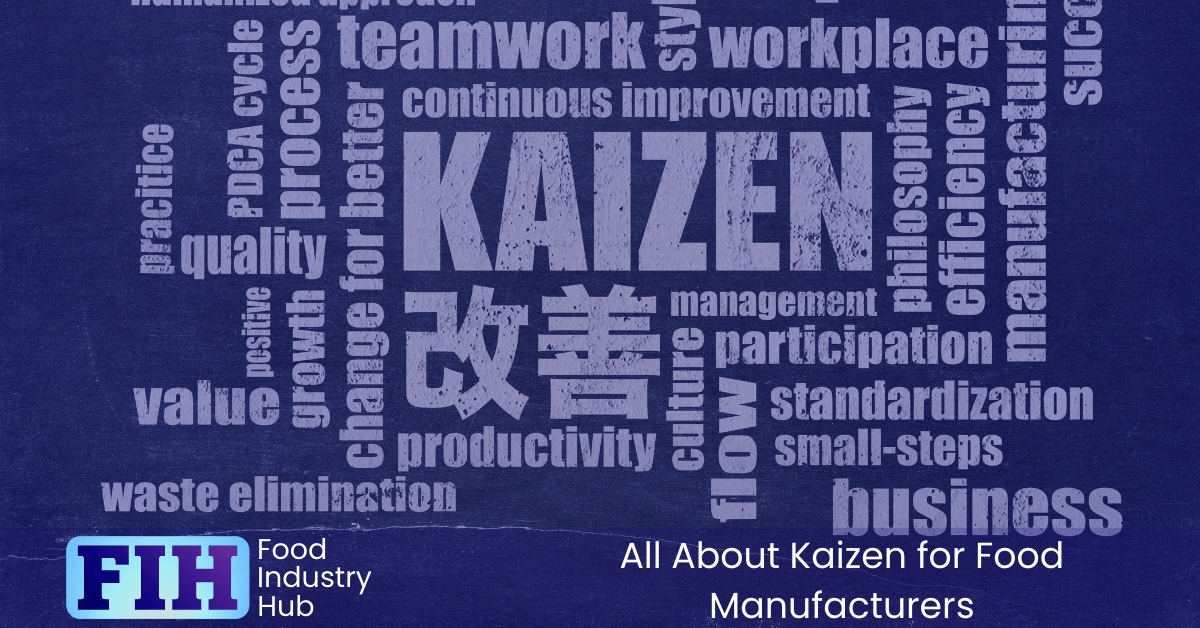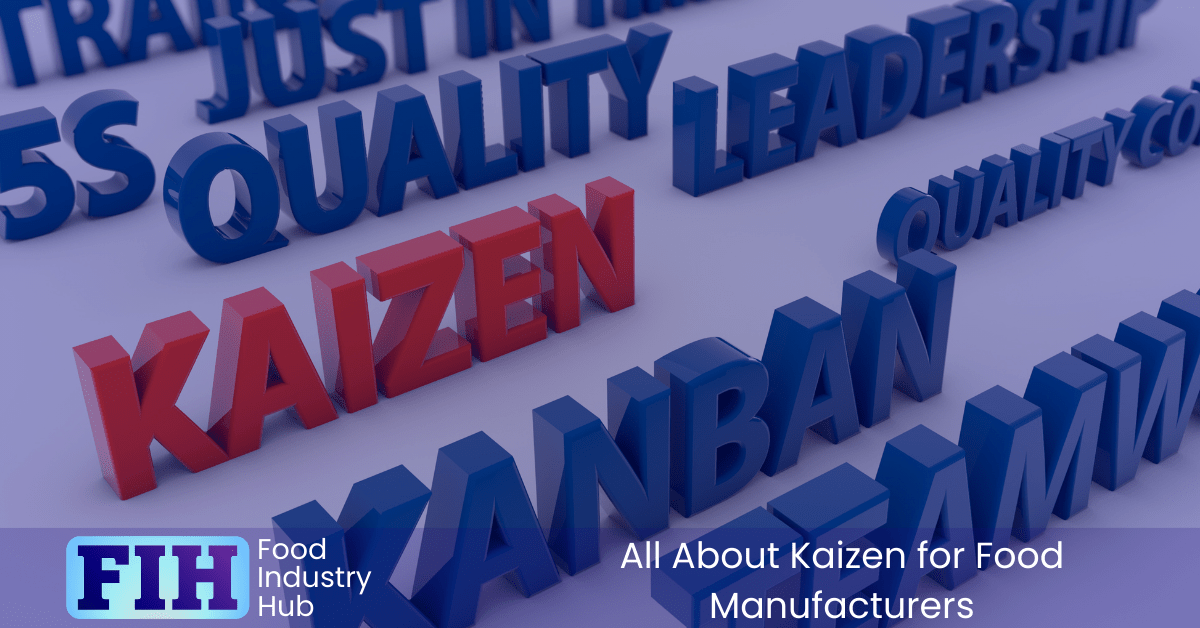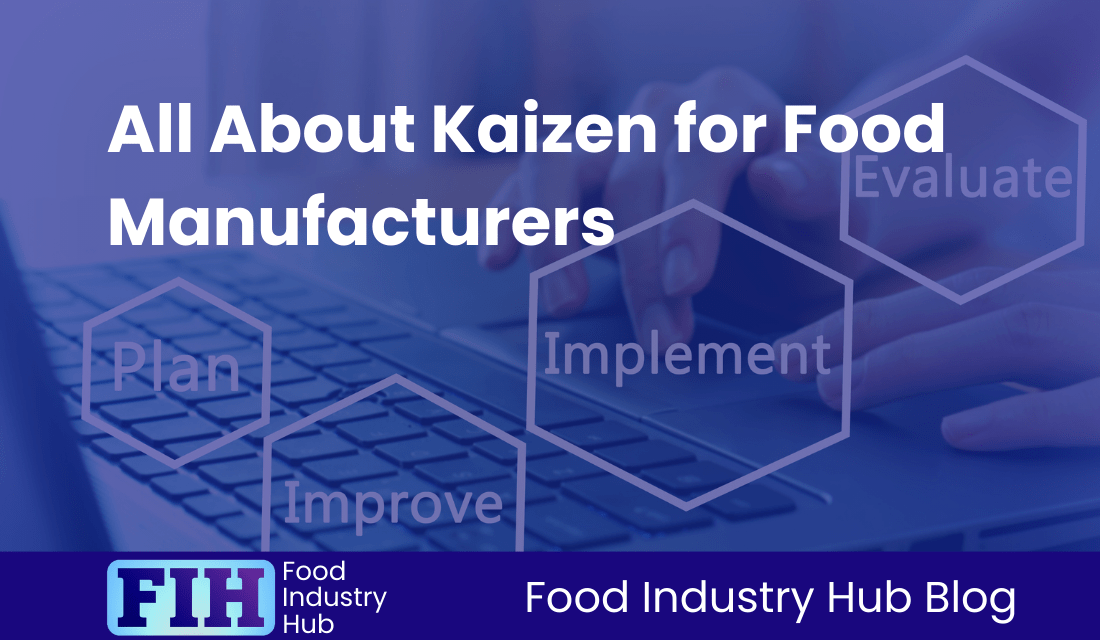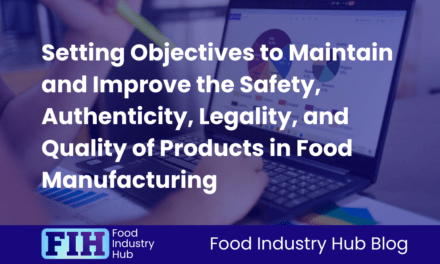Introduction
Food manufacturers face increasing pressure to improve efficiency and quality while reducing costs. In today’s competitive market, finding ways to optimise processes and enhance productivity is crucial.
That’s where Kaizen comes in. This continuous improvement methodology has been proven to make a significant impact in the food manufacturing industry. But what exactly is Kaizen, and how can it benefit your organisation?
Stay tuned as we explore all aspects of Kaizen for food manufacturers, from its principles and tools to overcoming challenges. Get ready to take your food manufacturing processes to the next level with Kaizen.
Table of Contents
Key Takeaways
- Kaizen is a Japanese philosophy that focuses on continuous improvement in all aspects of business, including manufacturing processes.
- Implementing Kaizen principles in the food manufacturing industry can lead to improved efficiency, reduced waste, and increased productivity.
- Kaizen encourages employee involvement and empowerment, creating a culture of continuous improvement and fostering innovation.
- Key tools and techniques for implementing Kaizen in food manufacturing include Gemba walks, the 5 Whys technique, value stream mapping, the PDCA cycle, and standardised work.
Leverage Food Industry Hub Management Systems to manage compliance and food safety effortlessly throughout your manufacturing operations.
What Is Kaizen?
What exactly is Kaizen and how can it benefit food manufacturers?
Kaizen is a Japanese philosophy that focuses on continuous improvement in all aspects of business, including manufacturing processes. By implementing Kaizen principles, food manufacturers can streamline their operations, reduce waste, and increase efficiency. This can lead to improved quality control, lower production costs, and shorter lead times.
Kaizen encourages employees to identify and address problems or inefficiencies in real-time, fostering a culture of continuous improvement. It emphasises the importance of small, incremental changes that can have a significant impact over time.
Importance of Kaizen
Implementing Kaizen principles is very helpful for food manufacturers in order to optimise their operations and achieve continuous improvement.
Kaizen, which focuses on small, incremental changes, allows food manufacturers to identify and reduce waste in their processes, leading to increased efficiency and productivity.
By implementing Kaizen, manufacturers can improve product quality, reduce lead times, and enhance customer satisfaction.
Additionally, Kaizen encourages employee involvement and empowerment, creating a culture of continuous improvement and fostering innovation within the organisation.

Sign-up for the Food Industry Hub Mail Service
We regularly produce new content for food industry professionals, and the Food Industry Hub Mail Service is the best way to stay up to date with the latest additions.
Signup today to be added to the Food Industry Hub mailing list.
Benefits of Implementing Kaizen in Food Manufacturing
By implementing Kaizen in food manufacturing, you can reap numerous benefits that will positively impact your operations and drive business growth.
One of the key benefits is improved efficiency. Kaizen encourages continuous improvement and optimisation of processes, leading to reduced waste, increased productivity, and shorter lead times. This can result in cost savings and improved customer satisfaction.
Another benefit is better quality control. Kaizen emphasises the identification and elimination of defects, ensuring that your products consistently meet high standards. This can enhance your brand reputation and customer loyalty.
Kaizen also promotes employee engagement and empowerment. By involving your workforce in problem-solving and decision-making, you can foster a culture of continuous learning and improvement. This not only boosts morale but also encourages ownership.
Ultimately, implementing Kaizen in food manufacturing can help you achieve sustainable growth and stay competitive.
Key Principles of Kaizen
To effectively implement Kaizen in food manufacturing, it’s important to understand and apply its key principles. These principles provide a framework for continuous improvement and can help food manufacturers achieve operational excellence.
The first principle is to focus on customer satisfaction. By understanding the needs and preferences of your customers, you can continuously improve your products and processes to meet their expectations.
The second principle is to empower employees. By involving your workforce in decision-making and giving them the authority to make changes, you can tap into their knowledge and creativity to drive improvements.
The third principle is to embrace a data-driven approach. By collecting and analysing data, you can identify areas for improvement and make informed decisions.
Finally, the fourth principle is to promote teamwork and collaboration. By fostering a culture of collaboration, you can encourage cross-functional teams to work together towards common goals.
Kaizen Tools and Techniques for Process Improvement
One effective way to drive process improvement in food manufacturing is by utilising Kaizen tools and techniques. These tools and techniques are designed to help identify and eliminate waste, improve productivity, and enhance overall efficiency in the manufacturing process.
Gemba Walks
A Gemba Walk is a workplace walkthrough intended to observe employees, find out about activities being undertaken, and provide firsthand understanding of operational processes. When implementing Gemba Walks as part of your continuous improvement strategy, your focus shifts to observing processes firsthand on the ground level. By physically going to where the work is being done, you gain valuable insights into inefficiencies and opportunities for optimisation.
During these walks, engage with employees, ask questions, and listen attentively to their feedback. Direct observation allows you to understand the current state of operations, identify bottlenecks, and witness workflow dynamics. Take notes, capture data, and use this information to drive informed decisions for improvement.
Gemba Walks promote a culture of transparency, collaboration, and problem-solving, empowering you to make impactful changes that enhance productivity and quality at the source.
Small, Incremental Improvements
Engage in making small, incremental improvements consistently to drive ongoing progress and enhance overall efficiency. By focusing on making minor adjustments regularly, you can steadily enhance processes, reduce waste, and boost productivity.
Start by encouraging team members to identify and address small issues that hinder efficiency. These could include simplifying a task, streamlining communication channels, or organising workspaces for better flow. Implementing these incremental changes allows for continuous enhancement without disrupting daily operations.
Empowering Workers
How can workers be empowered to enhance their contributions and drive innovation within the organisation?
Empowering workers involves building a culture where employees feel valued, respected, and encouraged to voice their ideas. Encourage open communication channels where employees can share suggestions and feedback freely.
Provide opportunities for training and skill development to help them excel in their roles and contribute more effectively.
Delegate decision-making authority to frontline workers, allowing them to make real-time improvements and take ownership of their work processes.
Recognise and reward employees for their contributions, motivating them to continue striving for excellence.
Standardisation and Simplification
Standardisation involves creating uniform methods for completing tasks, ensuring consistency and reducing errors. By establishing clear guidelines and protocols, you can minimise variations in processes, making it easier to identify and address inefficiencies.
Simplification, on the other hand, involves eliminating unnecessary steps or complexities in workflows. By breaking down intricate processes into more manageable components, you can improve clarity and speed up operations.
Standardising and simplifying procedures not only make tasks easier to understand but also pave the way for continuous improvement by providing a solid foundation for future enhancements. This approach fosters a culture of efficiency and effectiveness within your organisation.
Steps to Successfully Implement Kaizen in Your Food Manufacturing Facility
After familiarising yourself with the various Kaizen tools and techniques for process improvement in food manufacturing, it’s important to understand the steps required to successfully implement Kaizen in your own food manufacturing facility.
The first step is to create a culture of continuous improvement by fostering open communication and encouraging employee involvement.
Next, identify and prioritise areas for improvement by analysing data and gathering input from employees.
Then, develop a detailed plan of action, including specific goals and timelines.
Implement the plan by assigning responsibilities to team members and providing necessary resources and training.
Regularly monitor progress and make adjustments as needed.
Finally, celebrate successes and recognise the efforts of employees to maintain motivation and sustain the Kaizen mindset.

Creating a Kaizen Culture in Your Organisation
In order to create a Kaizen culture in your organisation, it’s essential to foster a mindset of continuous improvement among all employees. This means encouraging everyone to constantly seek ways to improve processes, identify waste, and suggest innovative solutions.
Start by communicating the importance of Kaizen and its benefits to your team. Provide training and resources to help employees understand the principles and methodologies of Kaizen. Encourage them to actively participate by sharing their ideas and suggestions for improvement.
Recognise and reward individuals and teams who contribute to the Kaizen culture. Additionally, establish regular review meetings to evaluate progress and discuss new improvement opportunities.
Overcoming Challenges in Adopting Kaizen for Food Manufacturers
Don’t let challenges deter you from adopting Kaizen for food manufacturing – embrace them as opportunities for growth and improvement. While implementing Kaizen in your food manufacturing processes, you may encounter challenges, but these shouldn’t discourage you.
One common challenge is resistance to change from employees who may be hesitant to embrace new methods and processes. To overcome this, it’s important to communicate the benefits of Kaizen and involve employees in the decision-making process.
Another challenge is the lack of resources or budget constraints. In such cases, you can start small and gradually implement Kaizen principles, focusing on areas that can generate quick wins.
Maintaining momentum and sustaining the Kaizen mindset may be challenging, but by providing continuous training, feedback, and support, you can ensure long-term success.
Sustaining Continuous Improvement with Kaizen
As you sustain continuous improvement with Kaizen in your food business, it’s crucial to foster a culture of ongoing learning and collaboration among your employees.
This culture of continuous improvement should permeate all levels of your organisation, from top management to frontline workers. Encourage your employees to constantly seek opportunities for improvement and provide them with the necessary support and resources.
Emphasise the importance of open communication and feedback, creating an environment where ideas and suggestions are welcomed and valued. Regularly hold team meetings and training sessions to share best practices, address challenges, and celebrate successes.
In Summary
Congratulations! You have now discovered the power of Kaizen in the food manufacturing industry. By implementing this continuous improvement philosophy, your organisation can unlock a world of benefits, from increased efficiency to enhanced customer satisfaction.
Like a well-oiled machine, your processes will flow smoothly, ensuring the highest quality products. Embrace the Kaizen culture and watch your organisation thrive.
The journey may have its challenges, but with determination and perseverance, success is within your grasp.
Further Resources
Food Industry Hub serves the food industry with a range of digital resources for the benefit of both commercial food manufacturers and food industry professionals.
For food manufacturers, we offer integrated management systems that give every user a direct interface with your QMS.
For food industry professionals, we provide an extensive signposting service in addition to informational content we hope you’ll find useful as you face new professional challenges. We have very ambitious plans to expand the range of services offered, and currently present informational content on management, safety and quality, and professional success.














